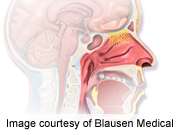Two biomarkers may aid diagnosis of rhinosinusitis

(HealthDay)—Two protein markers may serve as biomarkers for chronic rhinosinusitis, according to a proof-of-principle study published in The Laryngoscope.
Subinoy Das, M.D., from The Ohio State University in Columbus, and colleagues conducted proteomic-based analysis of cultures of nontypeable Haemophilus influenza (NTHI) using in vitro and in vivo studies and a novel, experimental chinchilla polymicrobial sinusitis model. Nano-liquid chromatography/tandem mass spectrometry was performed and compared to a reference standard real-time, quantitative reverse transcriptase polymerase chain reaction (RT-PCR)-based assay.
The researchers found that outer membrane proteins P2 (OMP-P2) and P5 (OMP-P5) were identified as promising candidates for the detection of NTHI biofilms. These markers were positively detected in nasopharyngeal secretions of chinchillas experimentally infected with NTHI. For the presence of NTHI biofilms, an RT-PCR-based test demonstrated 100 percent sensitivity and 100 percent specificity when tested against eight unique strains commonly found in human bacterial rhinosinusitis.
"Collectively, these data support the use of OMP-P2 and OMP-P5 as biomarkers for a human clinical trial to develop a point-of-care medical diagnostic test to assist in the diagnosis and treatment of CRS," the authors write.
More information:
Abstract
Full Text (subscription or payment may be required)
Copyright © 2014 HealthDay. All rights reserved.














